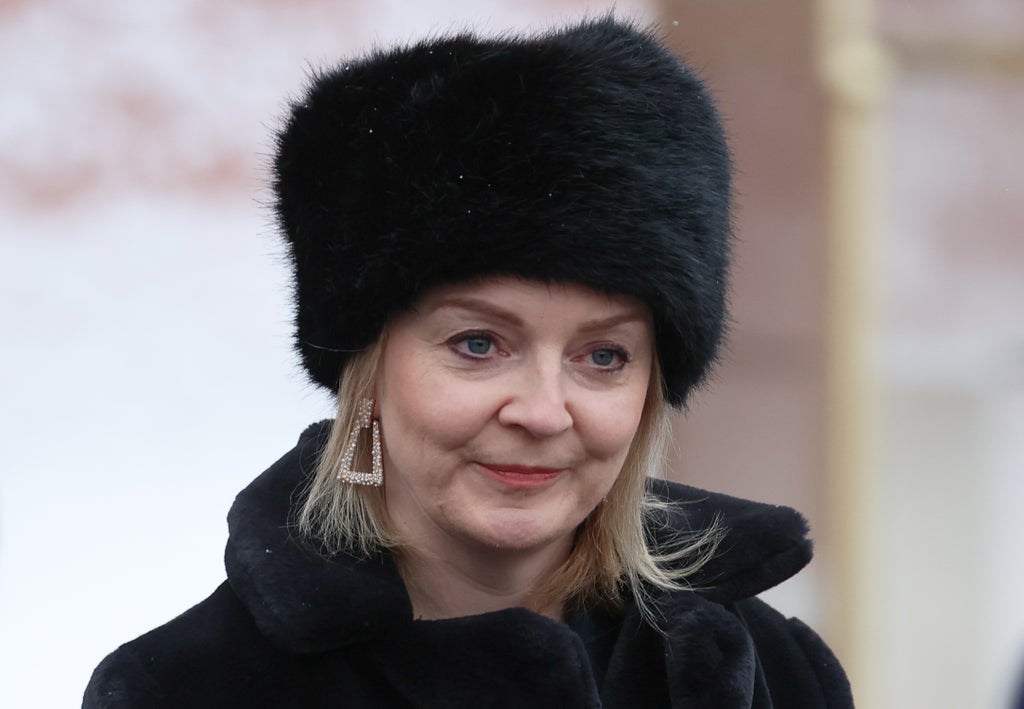
Liz Truss has urged Russia to dial down the “Cold War rhetoric”, as the British foreign secretary used a meeting with her counterpart in Moscow to warn that an invasion of Ukraine would be “disastrous”.
The foreign secretary told Sergei Lavrov it was still possible to avoid war in Ukraine, but warned that Nato allies would not “ignore” the build-up of Russian forces on the border.
“The reality is we cannot ignore the build-up of over 100,000 troops on the Ukrainian border and the attempts to undermine Ukrainian sovereignty and territorial integrity,” Ms Truss said.
She added: “Fundamentally, a war in Ukraine would be disastrous for the Russian and Ukrainian people, and for European security. And, together, Nato has made it clear that any incursion into Ukraine would have massive consequences and carry severe costs.”
The foreign secretary urged Vladimir Putin’s administration to respect the Budapest memorandum signed in 1994, which committed the UK, US and Russia to respect and uphold Ukrainian independence.
“If these principles are respected, I believe that, in today’s talks, we can make progress to strengthen security for all,” she told Mr Lavrov.
Mr Lavrov said Moscow was open to improving dire relations between Britain and Russia – but criticised “morality lectures”.
He said: “Of course we can only normalise relations through mutually respectful dialogue ... Ideological approaches, ultimatums, threats, morality lectures are a road to nowhere.”
It comes as Boris Johnson offered a grim warning for the immediate days ahead, as he spoke in Brussels alongside Nato’s chief before heading to Poland to offer support to eastern European allies.
The prime minister did not rule out going further in giving Ukraine military support in the event of an invasion by Russia. He said: “We will consider what more we can conceivably offer.”
Mr Johnson warned that the next few days were “probably the most dangerous moment … in what is the biggest security crisis Europe has faced for decades”.
Asked if a Russian invasion was inevitable, the PM replied: “I honestly don’t think a decision has yet been taken, but that doesn’t mean it is impossible that something absolutely disastrous could happen very soon indeed. Our intelligence … remains grim.”
The UK has put another 1,000 troops on standby in case of a humanitarian crisis in the east if the current Russian military build-up leads to war.
Additional troops are being placed on readiness to provide a humanitarian response if required, although they could also be used to provide further support to allies in the region.
Around 350 Royal Marines from 45 Commando are to begin deploying to Poland as part of a further strengthening of UK support to the country announced earlier this week.
Sir Keir Starmer will also meet Mr Stoltenberg on Thursday as the Labour leader strives to break with the party’s perceived weak stance on defence under his predecessor Jeremy Corbyn.
In an interview with The Times, Sir Keir said “we are firm and united in our support for Nato”, and he argued Mr Johnson’s standing on the world stage has been weakened by the Partygate scandal.
“His authority has been diminished because of the various activities over the last few months,” Sir Keir said.
Russia currently has an estimated 130,000 troops massed along the border with Ukraine, prompting fears that it is preparing for a full-scale invasion.
French president Emmanuel Macron, who met Mr Putin in Moscow earlier this week, said the Russian president had told him he is not seeking to escalate the situation.
However, with large-scale Russian military exercises about to begin in Belarus, which also borders Ukraine, there are fears they could be cover for an attack.
While there is no appetite among Western powers for direct military intervention in Ukraine, which is not a Nato member, they have warned of crippling sanctions in the event of any Russian incursion.
Defence secretary Ben Wallace, set to visit Moscow on Friday, said the 1,000 extra troops could be sent to any Nato country where there are consequences of an invasion of Ukraine, including the Baltic states, Poland, Romania and Nordic nations.
“Should Russia invade Ukraine I think we can expect very large movements of people as refugees and that in itself can be very destabilising to small and medium-sized states,” he told BBC Radio 4’s Today programme.







